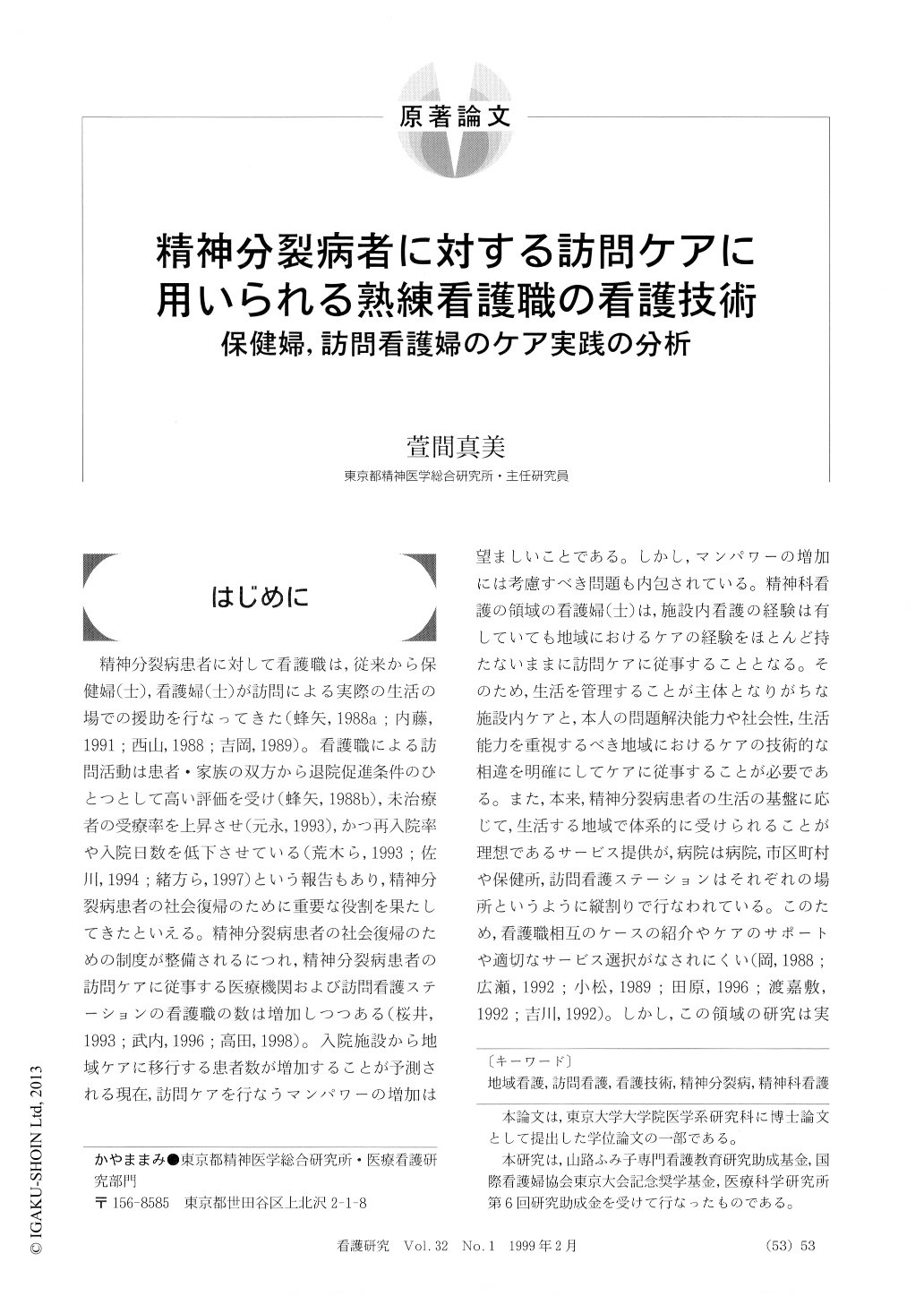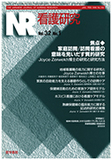Japanese
English
- 有料閲覧
- Abstract 文献概要
- 1ページ目 Look Inside
- サイト内被引用 Cited by
はじめに
精神分裂病患者に対して看護職は,従来から保健婦(士),看護婦(士)が訪問による実際の生活の場での援助を行なってきた(蜂矢,1988a;内藤,1991;西山,1988;吉岡,1989)。看護職による訪問活動は患者・家族の双方から退院促進条件のひとつとして高い評価を受け(蜂矢,1988b),未治療者の受療率を上昇させ(元永,1993),かつ再入院率や入院日数を低下させている(荒木ら,1993;佐川,1994;緒方ら,1997)という報告もあり,精神分裂病患者の社会復帰のために重要な役割を果たしてきたといえる。精神分裂病患者の社会復帰のための制度が整備されるにつれ,精神分裂病患者の訪問ケアに従事する医療機関および訪問看護ステーションの看護職の数は増加しつつある(桜井,1993;武内,1996;高田,1998)。入院施設から地域ケアに移行する患者数が増加することが予測される現在,訪問ケアを行なうマンパワーの増加は望ましいことである。しかし,マンパワーの増加には考慮すべき問題も内包されている。精神科看護の領域の看護婦(士)は,施設内看護の経験は有していても地域におけるケアの経験をほとんど持たないままに訪問ケアに従事することとなる。そのため,生活を管理することが主体となりがちな施設内ケアと,本人の問題解決能力や社会性,生活能力を重視するべき地域におけるケアの技術的な相違を明確にしてケアに従事することが必要である。また,本来,精神分裂病患者の生活の基盤に応じて,生活する地域で体系的に受けられることが理想であるサービス提供が,病院は病院,市区町村や保健所,訪問看護ステーションはそれぞれの場所というように縦割りで行なわれている。このため,看護職相互のケースの紹介やケアのサポートや適切なサービス選択がなされにくい(岡,1988;広瀬,1992;小松,1989;田原,1996;渡嘉敷,1992;吉川,1992)。しかし,この領域の研究は実践報告が個別の事例報告の形で現れ始あた段階にとどまっており(伊藤ら,1991),各職種が別個に業務を報告しているため,看護職による訪問ケア全体の実証的な研究はみられない。
This study is a descriptive study about the clinical competencies of experienced Japanese public health nurses and visiting nurses who are visiting patients with schizophrenia living in the community. The subjects were twelve experienced public health nurses, fourteen hospital nurses and four nurses working at home visiting station with an average of twenty-four years experience. The method of data collection was personal interview. Each interview was tape recorded with the permission of the subjects. The data were analyzed by the continual comparative method of the grounded theory approach. To assure the validity of data analysis, ten of the thirty subjects were requested to complete a questionnaire about the credibility, fitness, understanding, generality and control of the research. The categories of clinical competencies were 1) creating relationships between patients and nurses, 2) concern for daily activities, 3) patient's advocacy to live in the community, 4) consuiting about the patient's specific medical care, 5) dealing with family matters, 6) symptom management, 7) cooperation with the community and various professions. Thirty-five sub categories were identified under these seven categories. The purpose and the subjects of home visiting were different. RN did compensatory care for patient's permanent ability deficit. Because RN's subjects were discharged from mental hospital after long-term admission. In contrast, PHN created new relationship with new case which requested by families and neighbor. They are often afraid to create new relationship with others. So PHN often used empowerment techniques. It makes patients to make self-determination among creating new relationships.

Copyright © 1999, Igaku-Shoin Ltd. All rights reserved.


